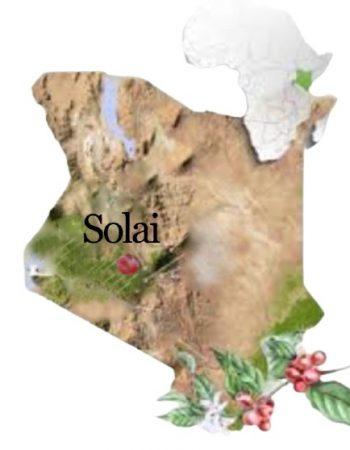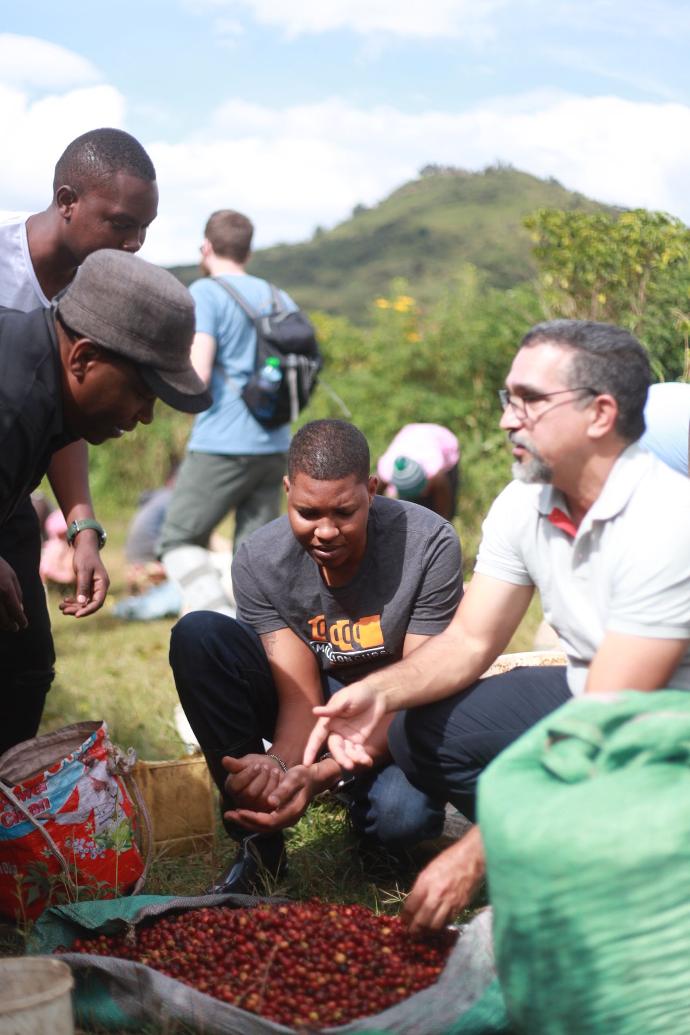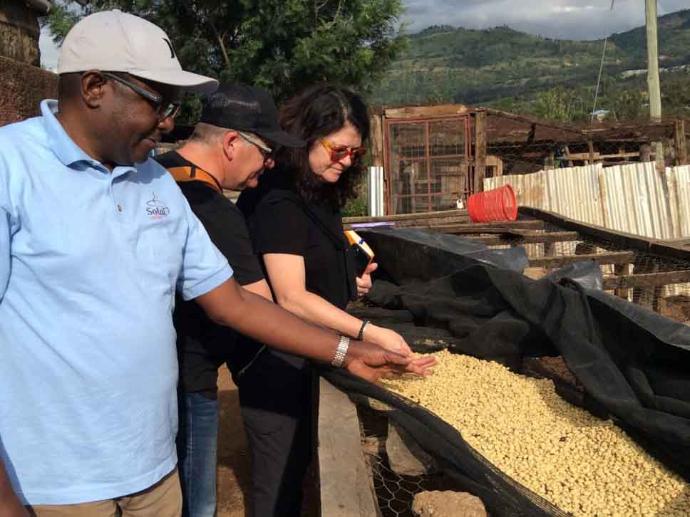Kenyan Coffee
Did you know Kenya produces some of the finest coffee beans in the world? Kenyan coffee holds special regard for many coffee enthusiasts around the globe. And rightly so! American coffee lovers average 2.7 cups per day, according to The Motley Fool statistics. And if you ask why they adore Kenyan coffee beans, the answer is simple: the tantalizing aroma and exquisite flavor. Kenyan Coffee beans are known for their rich flavors and aroma, which keep consumers asking for more!

Solai is a prosperous region in the Rift Valley where the climate is suitable for growing coffee.
Replenish your shelf with Solai Coffee, your trusted supplier of top-quality Kenya Coffee Beans! Remember, with Solai Coffee, one sip, that's it! Instant joy!
Ideally, if you ask anyone why they love Kenyan coffee beans, they will rightly respond; Because of their mouth-watering aroma and flavor.
Precisely, many coffee drinkers in the US will not understand the process Kenya’s top export undergoes from being a coffee bean to a cup. Explore with me the history of Kenyan Coffee, understand production, climatic conditions, processing, export, and regulatory bodies, among other makings of your special cup!
Coffee farming started
in the 19th century.
When did Coffee Cultivation Start In Kenya?
Did you know the history of Kenyan coffee is deeply rooted in the country's struggle for independence from the British colony? Coffee farming in Kenya began in the 19th century after the arrival of a Scottish missionary, John Paterson, in the late 1800s. Mr. Patterson was intrigued by the ideal climatic conditions of the Mount Kenya region for growing what would become Kenyan coffee beans. He inspired the arrival of other European missionaries and began large-scale coffee farming in the region. Since then, coffee-growing regions in Kenya have spread to other parts of the country.
What Climatic Conditions Support the Growing of Kenyan Coffee?
Kenyan coffee-growing regions are known for their ideal tropical climate, where coffee finds its perfect sanctuary. The regions has a unique blend of balanced temperatures and distinct seasons, which make the perfect conditions for truly special coffee flavors. October to November and April to June bring abundant rain for Kenyan coffee beans to thrive. The rest of the months are made of dry spells, which make way to harvest Kenyan coffee berries by hand!
 Solai Coffee along with visitors sorting harvested coffee cherries and share wits.
Solai Coffee along with visitors sorting harvested coffee cherries and share wits.Production of Kenyan Coffee
Did you know coffee production in Kenya started in 1893? Kenya celebrates over a century of production of special Kenyan coffee beans. Coffee production in Kenya is estimated to cover over 160 000 hectares of land. Unfortunately, the total annual production of Kenyan coffee has wavered due to climate change and other socio-economic factors
Each year, two well-defined flowerings occur soon after commencing rains in March/April or October. Most regions in Kenya see their coffee crops ripen from October to December. Production of Kenyan coffee is currently around one million bags per year
How is Kenyan Coffee Processed?
Coffee farmers in Kenya process almost all their coffee using a “wet method” to guarantee the best quality. Farmers pick the ripe red cherry only. The coffee berries are then transported to the factory, where hand-sorting of cherries is done before processing, and the unwanted cherries(unripe, over-ripe, or diseased) are removed. Later, the cherries are pulped to extract the outer skin.
Next is the fermentation process, which aims to extract the slimy sugary coating on the beans, which remains after removing the outer skin. The fermentation process is completed after 36 hours. The beans are spread on a level, raised drying bed with constant regular turning. Once the coffee beans have dried completely, they are bagged and transported to the mills.

5 Quality Variants of Kenyan Coffee
Did you know Kenyan Coffee is available in 5 different variants? A single bean of coffee can be roasted to produce various coffee alternatives. Arabica coffee is the most popular coffee variant in the region and is responsible for the development of 5 distinct coffee variants, as outlined below,
- SL 34
SL 34 was chosen from French Mission Coffee at the former Scott's Laboratories. Its features are similar to SL28, although it is highly vulnerable to Coffee Berry Disease. SL34's cup quality is excellent, and its volume output is fine. The variety thrives in areas of high altitude with good rainfall.
- SL 28
It was developed at the Scott's Laboratories( now called The National Agricultural Laboratories, located at Kabete) on a sole tree base from the Tanganyika Drought Resistant variety chosen in Northern Tanzania in 1931. SL28 thrives well in areas with medium to high altitudes. Although this variety is resistant to drought, it is highly vulnerable to Leaf Rust and Coffee Berry Disease. It remains the class that thrived amongst Scott's Laboratories varieties in Kenya. One of the main reasons SL28 is successful is that the crop can stay unattended even for decades and start producing when easily revived.
- Ruiru 11
The Ruiru 11 variety was unleashed in 1985. Before this time, the Kenyan market was saturated highly by the SLs. It was fair until a coffee berry disease(CBD) erupted. About half of the production in Kenya dipped, forcing Kenya Research Institute in Ruiru to develop a variety that could endure severe conditions. The researchers produced an F1 hybrid and gave it the name 'Ruiru 11' from the site of the research base.
In addition, the variety is resistant to CLR and CBD. It is compact, allowing farmers to increase production per unit of land, particularly in densely populated high-potential areas where coffee competes with other crops. Ruiru 11 arrives earlier into production, achieving gains for the farmers earlier. Ruiru 11 was established with quality features indistinguishable from the traditional varieties. Ruiru 11 can be identified easily by looking at its leaf tips, which are dark green.
- K7
This variety was chosen at Legenet Estate in Muhoroni from the French Mission Coffee. It was established at about the same time as the SLs and was made by Scott's Laboratories. It is highly resistant to Leaf Rust and Coffee Berry Disease. K7 is mainly grown in areas of low altitude, where Leaf Rust is prevalent in Kenya. The output and quality of K7 are high.
- Batian
This variety is named after the highest peak of Mount Kenya. It is a tall plant with features equivalent to those of SL28. These features resist Coffee Berry Disease, Bacterial Blight of Coffee, and Leaf Rust. It was developed in 2010 by the Coffee Research Foundation. The distinction between Batian to Ruiru 11 is that Batian was established to have a greater taste form and still contain the same disease tolerance as Ruiru 11. Batian has an excellent yield at high altitudes, especially if competent farming practices are incorporated. It also has a high-speed maturation period; hence early benefits flow for the farmers.
What is the SHB and SHG Status of Kenyan Coffee?
Kenyan coffee has Strictly Hard Bean (SHB) and High Grown (SHG) coffee status. Kenyan Coffee Beans are grown in areas with an altitude of 1400 to 2000 meters above sea level. The coffee beans mature at this altitude, increasing the nutrients.
Discover Coffee Grading of Kenyan Coffee!
Kenyan coffee is graded differently. Throughout the history of Coffee in Kenya, cherries have been graded based on the bean's size, shape, and weight. There are about eight coffee bean grades in Kenya, and they are later classified on a numerical reference system on a scale of 1-10. 1 is the best and finest, and 10 is the least.
Solai coffee creates a direct trade relationship with the individual farmers and negotiates a fair price for the coffee. By doing so, our farmers are empowered to produce coffee without sacrificing quality
Kenya Coffee Grades types:
- PB: These are round beans, normally one in cherry.
- AB: This class is a combination of A and B(6.80mm screen)
- AA: They are large beans of 20mm screen size
- E: These are the largest beans (Elephants)
- C: These are beans smaller than B
- T: These beans are the smallest and thinnest, mostly faulty and broken
- TT: This class contains any light coffee blown away from all grades, mostly from elephants.
- MH/ML: MH/ML– Mbuni refers to coffee that has not undergone the wet process(unwashed). It entails around 10% of the total crop and is graded as MH (heavy mbuni) and ML (light mbuni). This grade fetches lower prices and has a sour taste.
Is Kenya a "Coffee Drinking Country"?
Kenya, in principle, needs to be recognized for abundant coffee production. With only 150,000 hectares dedicated to coffee growing, the output still needs to grow. Nonetheless, despite this, a sizable proportion of Kenyans prefer tea to coffee. Kenyan coffee cultivation is mostly done for export purposes.
The main coffee-growing regions in Kenya include:
-Nyeri - Murang’a - Mt Kenya West - Ruiru - Kiambu - Kirinyaga -Thika
However, other coffee-growing regions exist in the Rift Valley and the Western part around Mt. Elgon.
Kenyan coffee is grown by small-scale farmers who are over 500K. The farmers are organized into different co-operatives. Kenyan coffee contributes about 0.2% of the country's GDP as a major cash crop.
The Coffee Board of Kenya is responsible for safeguarding the quality and other aspects concerning the production of Kenyan coffee. CBK acts as a promoter and guardian of various matters concerning Kenyan Coffee to ensure better production habits and maintain their coffee's good reputation.Ideally, CBK is a catalyst that enables the cultivation of Kenyan Coffee to reach new heights.
Kenyan Coffee beans make some of the world's most remarkable cups you could ever find.
Kenya Coffee History